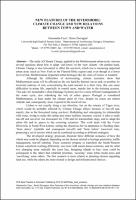Chapter New Features of the rivershore: climate change and new relations between town and water
| dc.contributor.author | Casu, Alessandra | |
| dc.contributor.author | Zaccagna, Jlenia | |
| dc.date.accessioned | 2022-06-01T12:13:43Z | |
| dc.date.available | 2022-06-01T12:13:43Z | |
| dc.date.issued | 2020 | |
| dc.identifier | ONIX_20220601_9788855181471_288 | |
| dc.identifier.issn | 2704-5846 | |
| dc.identifier.uri | https://library.oapen.org/handle/20.500.12657/56105 | |
| dc.description.abstract | Climate scenarios show that Mediterranean areas will be affected by torrential patterns of rain, that can cause difficulties in urban life in coastal areas, mainly due to the draining systems and to the sea-level. Lisbon is on the estuary of Tagus river, which would be probably affected by run-off and by the forecasted rising sea-level. Redesigning its relationship with water, trying to make this urban area more resilient, becomes crucial and asks to study run-off and sea-level rise for 2100 and for intermediate steps, to adapt the urban life and its spaces to the occurring scenarios. | |
| dc.language | English | |
| dc.relation.ispartofseries | Proceedings e report | |
| dc.subject.other | Waterfront | |
| dc.subject.other | Climate Change | |
| dc.subject.other | Adaptation | |
| dc.subject.other | Resilience | |
| dc.subject.other | Urban Strategic Projects | |
| dc.title | Chapter New Features of the rivershore: climate change and new relations between town and water | |
| dc.type | chapter | |
| oapen.identifier.doi | 10.36253/978-88-5518-147-1.18 | |
| oapen.relation.isPublishedBy | bf65d21a-78e5-4ba2-983a-dbfa90962870 | |
| oapen.relation.isbn | 9788855181471 | |
| oapen.series.number | 126 | |
| oapen.pages | 9 | |
| oapen.place.publication | Florence |

